Young Indigenous leaders from Southeast Asia unite at YEEHA 2024 for forest and climate leadership
By Airi Gavan and Loek Sreyvi, with contributions from Dazzle Labapis and Kate Mana-Galido

Group photo of YEEHA participants and organizers during the landscape visit at the Motaue Village, Kulawi, Indonesia (Photo courtesy of Pak Irfan/ Tropenbos Indonesia)
The Youth Engagement and Empowerment Hive in Asia (YEEHA) Regional youth camp is a two-part event held in Palu City and Lariang landscape: Kulawi sub-district, Sigi within Central Sulawesi, Indonesia from July 17 to 23, 2024. The 1st youth camp was held online. The 2nd Regional Youth Camp was in 2023, held in the Lomunu Training Center of PACOS Trust in Penampang, Sabah, Malaysia. Now in its third iteration, with the second being conducted in person, the regional youth camp has established itself as a crucial platform for knowledge exchange and practical training, empowering young Indigenous Peoples to become leaders in forest and climate action. The event was organized to create a network of youth champions from different Asian landscapes involved in meaningful learning and exchange on forest and climate youth leadership track for a just future.
More than thirty Indigenous youth, including 23 female and 13 male participants from Cambodia, Indonesia, Malaysia, Myanmar, the Philippines, and Vietnam joined to share their perspectives on environmental issues, challenges, and ongoing initiatives they partake in and advocate in their respective countries.
Collective learning about the significance of the forests and spaces for youth empowerment
The six-day camp began with the opening remarks of Mr. Shadiq, Chairman of Imunitas and Mr. Anang Setiawan, Executive Director of NTFP-EP Indonesia. He expressed joy at co-hosting the event with Imunitas and highlighted their long-standing collaboration to improve local livelihoods. Palu’s vulnerability to natural disasters, such as tsunamis and earthquakes, was mentioned to illustrate the impacts of climate change. Ms. Katherine Mana-Galido facilitated the introduction to YEEHA and its objectives. The training started with participant introductions, group formation, and establishing camp guidelines with Mr. Jonas Vertudez of NTFP-EP Philippines. The Indigenous youth shared their communities’ challenges, forest conditions, biodiversity, youth activities, and cultural heritage.
To start the learning sessions, an overview of the status of the forests in Asia and the significance of their ecosystem services were discussed by Airi Gavan of NTFP-EP Asia. This was followed by activities facilitated by Joy Quetula of Forest Foundation Philippines encouraging participants to map and present their communities’ ecological assets. The concept of the Indigenous and Community Conserved Areas (ICCAs) as territories of life was introduced by Ms. Asami Segundo of NTFP-EP Asia. As the regional coordinator of the ICCA Southeast Asia consortium, she passionately affirmed the crucial importance of the Indigenous people in the ancestral area, stating,” The reason why we still have forest biodiversity today is because of the Indigenous People.”

Learning sessions on forest and biodiversity by Ms. Joy Quetula of Forest Foundation Philippines (upper left), sharing sessions of the country context of the Southeast Asian youths (upper right and lower left, and establishing the YEEHA team spirit (lower right) (Photo courtesy of Pak Irfan/ Tropenbos Indonesia)
Understanding rights is a key component of YEEHA. Day two continued with learning sessions on the topics of the United Nations Declaration on the Rights of Indigenous People (UNDRIP), the Universal Declaration of Human Rights (UDHR) which was led by Asami Segundo, and the discussion of the ASEAN Guideline on the Recognition of Customary Tenure (CT) in Forested Landscapes, led by Dazzle Labapis. Ms. Segundo also tackled the Science of Climate Change impacts, climate justice, and how Indigenous youth can represent and support effective implementation. Furthermore, in this session, the participants expressed a strong sense of Indigenous identity through reflecting on their historical documents, ancestral dwellings, and cultural practices and traditions. Lawrence Win Anak Duka, a youth from Malaysia, shared,“I identify as an Indigenous person because of my ancestors and because I practice our culture and tradition in our traditional land.”
Group activities tackled the concept of inclusive forest governance and feminist participatory action research (FPAR). This is a transformative tool for positive change for women in forest governance. In these sessions, youth get to dive deeper into sustainable forest governance and how women’s initiatives can participate in these activities. Ms. Irene Koesoetjo of Tropenbos Indonesia concluded her presentation by saying,” We need to bring all the actors. There should be consent from local communities, and it is doable for everyone if you undergo FPAR training.”
The synthesis of the youth groups reflected that there should be more initiatives to inspire little girls and boys for gender equality and increase women’s inclusion in decision-making processes in conservations dedicated to community development. Intergenerational dialogues were highlighted as a good practice for letting the elders realize that the old ways are gender-biased and that there is a need to develop and implement gender-based strategies. In the evening, cultural exchanges through the presentations and performances given by the youth delegate fostered camaraderie.
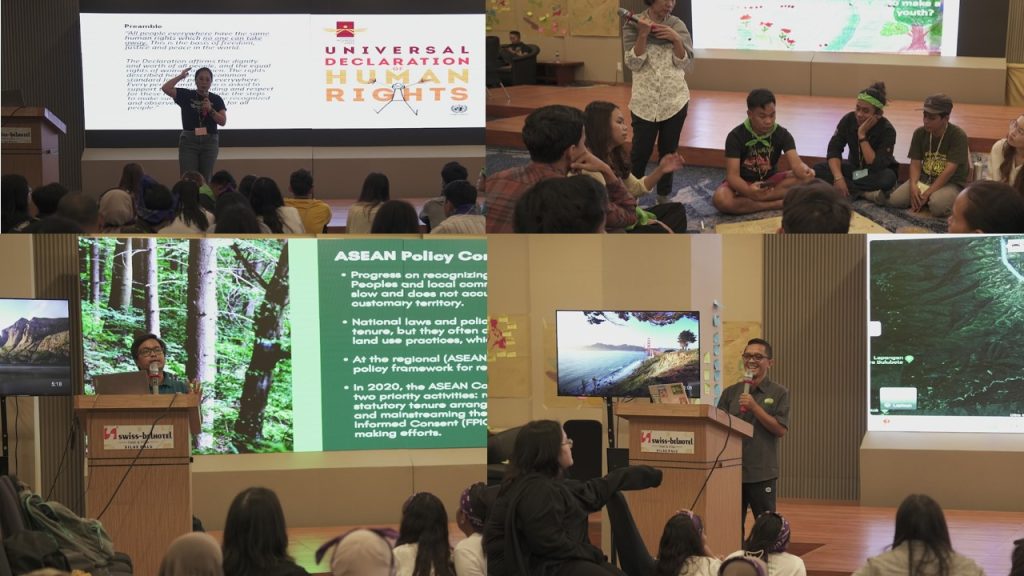
Sharing sessions on human rights, Indigenous Peoples rights, and climate action by Ms. Asami Segundo of NTFP-EP Asia (upper left), ASEAN Customary Tenure Guidelines by Dazzle Labapis of NTFP-EP (upper right), Forest Governance and Feminist Participatory Action Research by Ms. Irene Koesoetjo of Tropenbos Indonesia (lower left), and Orientation to the Landscape Visit by Anang Setiawan of NTFP-EP Indonesia (Photo courtesy of Pak Irfan/ Tropenbos Indonesia)
Day three introduced Tropenbos International’s youth-led initiatives. Dazzle Labapis of NTFP-EP also discussed global and regional climate policies, engagement opportunities, and networks on climate change. The United Nations Framework Convention on Climate Change (UNFCCC) is the body of the UN that works on climate actions. The Paris Agreement is one of the opportunities for youth to participate in decision-making processes and amplify their voices regarding climate action matters. The existing global and regional spaces for youth involved in climate action were enumerated, such as Asia Young Indigenous People Network (AYIPN), International Indigenous Youth Forum on Climate Change (IIYFCC), Youth Empowerment in Climate Action Platform (YECAP), among many others. The participants also listed local and regional organizations and platforms within their countries that they have worked with on climate change and forest conservation advocacies.
One of the participants, Elman Thiana from BRASTI, an organization composed mostly of young members of the Adat Dalem Tamblingan Indigenous people, shared his experience on the processes of successful youth-led initiatives where they identified the issues in their community. He showed his video project called The Guardian’s Struggle, highlighting the crucial roles of the forest and lake and how they find solutions by collaborating with elders and their peers on mapping and documenting. He said that IP youths face many different challenges. They should develop youth-led action plans by starting a community needs assessment. Elman is still hopeful to get their forest and lake in Tamblingan, Bali back.
The participants also agreed that they could do something as young Indigenous people, as they listed actions that include active involvement in documenting Indigenous knowledge, remapping the customary forests, replanting and landscape restoration, women empowerment, and being empathetic with the community’s struggles. After the training, participants received an orientation about the site and learned about mapping and drone operation. In the afternoon, the delegates traveled to Desa Mataue, where the Kaile Indigenous People extended a warm welcome with cultural dance and traditional meals.
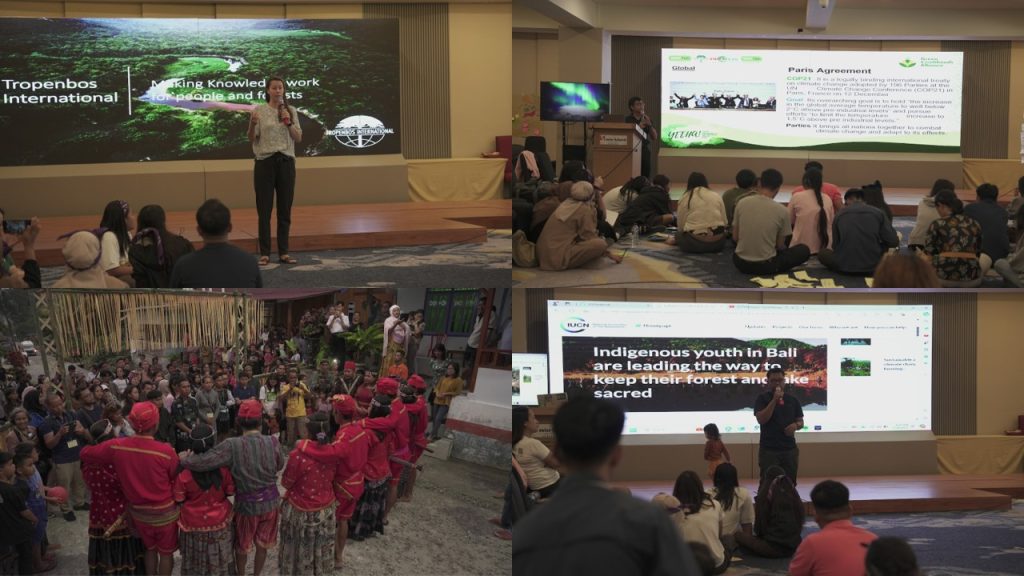
Sharing sessions on the work of Tropenbos International by Rosalien Jezeer of Tropenbos International (upper left), youth-led initiatives in Bali by Putu Gede Elman Thiana of BRASTI (upper right), global and regional climate policies by Dazzle Labapis of NTFP-EP (lower left), and landscape visit and community engagement in Mataue Village, Kulawi, Indonesia (Photo courtesy of Pak Irfan/ Tropenbos Indonesia)
Landscape Visit and Immersion in Mataue Village
The two-day immersion in Desa Mataue, Kulawi, was the camp highlight. On the fourth day, participants explored the verdant forest and interacted with the local Indigenous community. They learned from partners and project implementers about the women’s role in traditionally managing the pampa, a smallholding subsistence plot. The men prepare the land for farming, while the women cultivate crops such as vegetables, corn, cacao, and coffee. The land also became an informal, traditional school of medicine for them.
Participants gained hands-on drone operation skills for mapping the area. They learned about sustainable rattan production, or “Rotan lestari,” including the Participatory Guarantee System (PGS) certification process that guarantees fair practices and environmental responsibility. They also discovered the impacts of the 2018 earthquake on the soil and the price and demand of rattan. The efforts of NTFP Indonesia and Imunitas to support rattan collectors in eliminating middlemen in the market were also mentioned.
Afternoon activities included a bark cloth-making workshop culminating in different creative presentations of each group sharing their reflections. Later in the evening, the participants bonded with the community through the Dero dance. On the fifth day, after bidding goodbye to their host families and the community, they briefly stopped at an area impacted by the 2018 earthquake’s liquefaction.
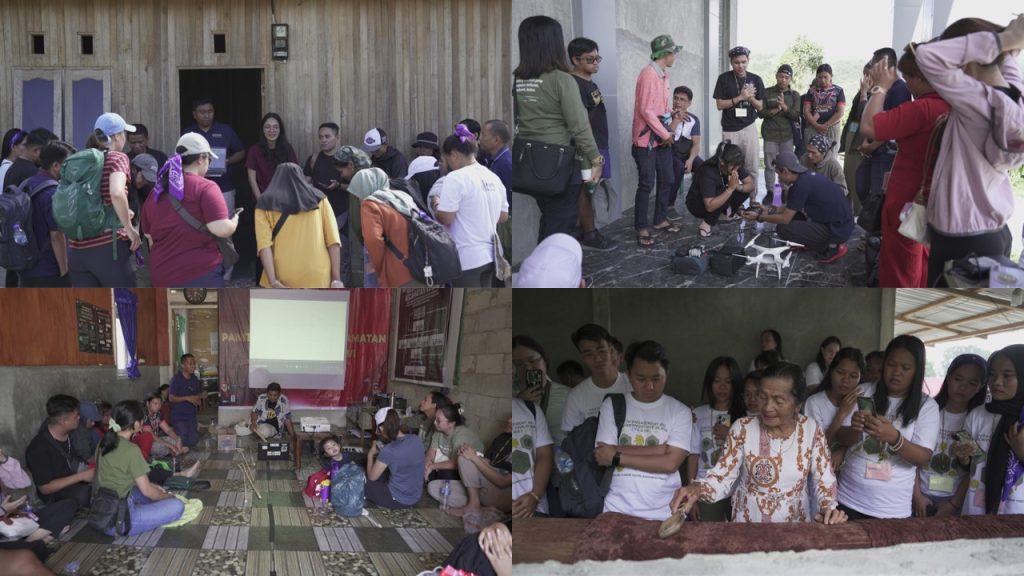
Forest walk and learning sessions about the women’s participation in natural resource management in Mataue village (upper left), operating a drone (upper right), sustainable rattan and PGS (lower left), and bark cloth making (lower right) (Photo courtesy of Pak Irfan/ Tropenbos Indonesia)
Brainstorming and synthesizing youth-led actions for Southeast Asia
Building on the insights gained from the learning sessions until the landscape visit, participants engaged in group reflections and developed youth landscape plans. On the sixth day of the camp, equipped with feedback and problem-solving tools, they collaborated in identifying actionable steps for their communities. They creatively shared their critical takeaways through videos, newscasts, and talk shows emphasizing cultural preservation, sustainable forest management, regional collaboration, and digital advocacy.
They also shared ongoing challenges, youth initiatives, and regional achievements. Various groups then presented proposed action plans outlining their country’s context, partners, goals, and timelines. Common issues included land conflicts, illegal mining, deforestation, climate change, and cultural loss. They were able to deliver capacity plans with proposed partners and potential mentors to influence policies in their respective countries, promoting sustainable livelihoods, agroforestry, and NTFP development and expanding their reach in both online and offline spaces.
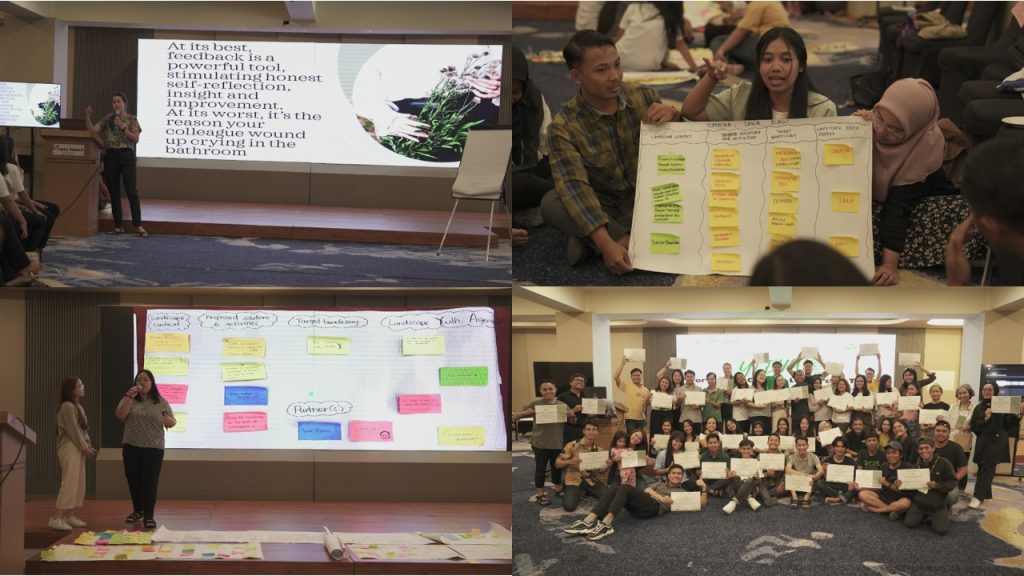
Learning sessions on giving feedback by Rosalien Jezeer of Tropenbos International (upper left), developing and improving proposals on youth-led landscape actions (upper right), presentation and exchange between groups (lower left, and YEEHA 2024 closing ceremony (lower right) (Photo courtesy of Pak Irfan/ Tropenbos Indonesia)
Expanding the YEEHA! Impact
Immersed in learning, cultural exchange, and teamwork for almost a week, participants gained a deeper grasp of environmental challenges and developed practical solutions. Inspired by this gathering of tomorrow’s Indigenous leaders, they are motivated to treasure their Indigenous roots further and combine their ancestral knowledge with science-based approaches to address environmental challenges. Priscilla Tuyan Jalong Kallang from SAVE RIVERS in Malaysia enthusiastically said,”I gained a lot of information about UNDRIP and that I should learn more on Indigenous Peoples’ rights to be more effective in development work.”
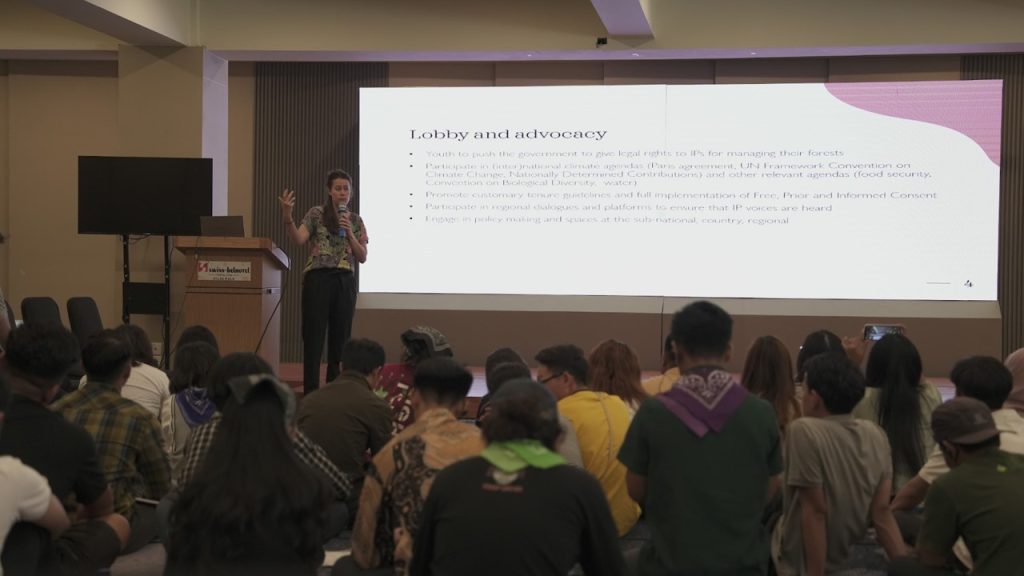
Rosalien Jezeer of Tropenbos International presents the synthesis of key recommendations presented by the YEEHA campers (Photo courtesy of Pak Irfan/ Tropenbos Indonesia)
The YEEHA camp’s influence extended beyond Palu. Several participants represented their countries at the Meeting the Future Landscape Leaders: Dialogue with Youth Leaders in Jakarta last July 24th, sharing their camp experiences and outlining implementation plans, as well as the key recommendations from the YEEHA campers this year. As Mamilmar M. Dubria Jr., a delegate and president of UGNAYIN National Indigenous Youth Network from the Philippines, stated,” I will bring home the knowledge and strategies to increase youth participation in addressing challenges faced by Indigenous communities. After YEEHA, I will implement activities for youth information, education, and communication (IEC) and re-echo these by planning initiatives to enhance youth inclusion in Indigenous Knowledge Systems and Practices (IKSP).”

Indigenous youth participants and representatives of organizations that support environmental youth activities in All Season Thamrin Hotel, Jakarta last July 24, 2024 (Photo courtesy of Pak Irfan/ Tropenbos Indonesia)
The YEEHA Regional Youth Camp is part of NTFP-EP’s YEEHA Forest and Climate Leadership Track, a pilot program, aligned in Tropenbos International’s Youth it or Lose framework. This platform aims to establish and cultivate a youth-led project incubation lab supporting community forestry management and conservation initiatives.
To sustain engagement and enhance youth leadership, the leadership track will continue to curate and implement a series of online youth capacity strengthening sessions that will provide spaces for young Indigenous leaders on project planning and development, gender, , resource mobilization, skills training and mentoring within the year to support youth-led forest and climate action projects. With renewed passion, they are committed to overcoming obstacles and building a just future as they answer the call:
Siapa kita? YEEHA!
YEEHA! 2024 was organized by the Non-Timber Forest Products Exchange Programme Asia (NTFP-EP Asia) under its YEEHA Forest and Climate Leadership Track, Imunitas, NTFP-EP Philippines, NTFP-EP Indonesia in partnership with Tropenbos International and Tropenbos Indonesia, and by Green Livelihood Alliance (GLA) Indonesia country partners, including Consortium SIKLUS and Consortium ROA.
This event was supported by the Green Livelihoods Alliance (GLA), Pastor Rice Small Grants Fund (PRSGF), Forest Foundation Philippines SILG Program, and Tropenbos International and Tropenbos Indonesia.



